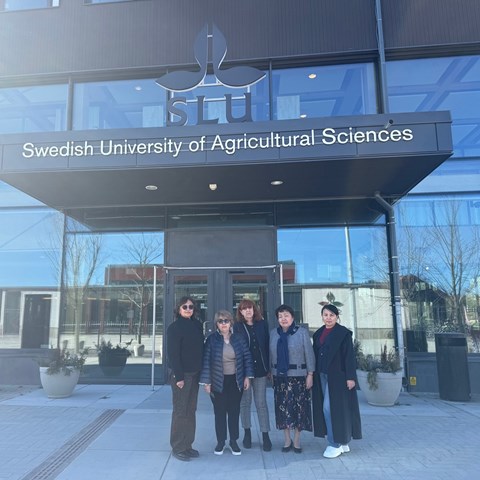Building bridges for clean water between Sweden, Kazakhstan and Georgia

A recent four-day visit to the Department of Molecular Sciences brought together representatives from Kazakhstan (M Auezov South Kazakhstan State University) and Georgia (I. Javakhishvili Tbilisi State University and P. Melikishvili Institute of Physical and Organic Chemistry) with the shared goal of fostering long-term collaborations focused on clean water and water purification technologies in the frame of ISTC Project #GE-2506: “Scientific substantiation of the possibility of creating new bactericidal zeolite filter materials for purification-decontamination water from various sources.” This visit marked a significant step in strengthening international partnerships and addressing one of the most pressing global challenges: access to clean water.
During the four-day visit, scientists from Kazakhstan and Georgia had the opportunity to meet with leading experts from SLU’s Department of Molecular Sciences Professors Gulaim Seisenbaeva and Vadim Kessler to discuss ongoing projects and explore avenues for future collaboration. The focus of the discussions was primarily on the critical issues surrounding clean water and water purification technologies. Clean water is essential not only for public health but also for sustaining ecosystems, agriculture, and industry. The visit provided a platform for experts from all three countries to brainstorm innovative solutions to improve water quality and access in regions that are facing increasing challenges related to water pollution.
“Water is an essential resource for life, and ensuring its purity is vital for both human consumption and environmental sustainability. As countries like Kazakhstan and Georgia continue to develop and urbanize, addressing water purification becomes even more crucial”, said Gulaim Seisenbaeva.
During the meetings, the teams explored advanced research in water filtration, treatment technologies, and the integration of molecular science to enhance the efficiency and cost-effectiveness of water purification processes. The potential for collaboration in these areas is immense, with Kazakhstan and Georgia benefiting from SLU’s state-of-the-art research facilities and the university’s expertise in molecular and environmental sciences.
“While SLU brings cutting-edge technology and scientific research to the table, Kazakhstan and Georgia have developed own innovative, locally-driven approaches to water purification that are well-suited to their particular needs, and could be adapted to other parts of the world”, said Professor Nato Mirdzveli from Georgia.
The discussions also extended beyond technology to include policy, sustainability, and education. The need for building a comprehensive approach that includes not only technical solutions but also awareness campaigns, government action, and educational programs was emphasized. Both Kazakhstan and Georgia have expressed strong interest in fostering deeper collaborations with SLU, as the institution’s cutting-edge research can significantly contribute to their national efforts to ensure safe, clean, and sustainable water resources for their populations.
The collaboration between SLU and universities from Kazakhstan and Georgia is a perfect example of how international partnerships can affect progress on global challenges. The exchange of knowledge, resources, and technological advancements will definitely play an important role in shaping the future of water purification systems worldwide.
Through this collaboration, the partners hope to create solutions that will have lasting impacts on water safety and quality, not only in Sweden, Kazakhstan and Georgia but also globally. The continued focus on clean water and water purification is essential for ensuring a healthier, more sustainable future for all.
“With clean water being a critical issue in today’s world, this visit is just a beginning of what promises to be a fruitful and impactful partnership”, underlined Professor, Head of Ecology Department Zhadra Shingisbayeva.
Participants in the meeting:
Professor Zhadra Shingisbayeva (Department of Ecology at M Auezov South Kazakhstan State University)
Professor Nagima Jakipbekova (Department of Chemistry at M Auezov South Kazakhstan State University)
Professor Nato Mirdzveli (I. Javakhishvili Tbilisi State University and P. Melikishvili Institute of Physical and Organic Chemistry)
Dr. Olga Chudakova (G.Tsulukidze Mining Institute, Tbilisi)



